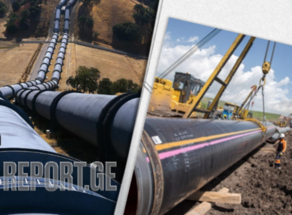
Additional gas resources offshore Azerbaijan could flow via the Southern Gas Corridor (SGC) in the future, as could gas from Turkmenistan, Elshad Nassirov, SOCAR vice president or investment and marketing, said on an Atlantic Council webinar, report.az informs referring to the S&P Global Platts.
Baku and Ashgabat made a major breakthrough last month when they signed a landmark agreement to jointly develop the Dostluk field that spans the border between the two countries’ maritime zones in the Caspian Sea, he said.
The agreement ended a 30-year dispute between Azerbaijan and Turkmenistan as to which country had the rights to develop the field, formerly known as Kepez in Azerbaijan and Sardar in Turkmenistan, he noted.
Nassirov said the deal would not have been possible without the signing in August 2018 of the Convention of the Legal Status of the Caspian Sea, completing the SGC and the end of the Armenia-Azerbaijan war in November last year.
"This new cooperation with Turkmenistan will open up more opportunities for Central Asian gas to also join the SGC," he said.
The name of the field was changed last year to Dostluk - meaning friendship - ahead of talks expected to resolve the long-standing dispute.
Nassirov said that under the 2018 Convention, a gas pipeline could be built between two gas fields in the Caspian Sea without the need for a separate environmental assessment.
He added that ultimately it would be up to Turkmenistan to decide how to develop its gas resources, adding that gas from Turkmenistan had already reached Turkey in the past via Iran.
Nassirov said the final budget of the project came in at $33 billion, well below the original $45 billion price tag.
Israel could also be a future source of gas to flow through the SGC, he said.
"Israeli gas to Turkey and then entering TANAP with swaps in the Turkish market is commercially the most viable option to export gas from the East Mediterranean into Europe, and we support that option," he said.
The TAP transports natural gas from the Caspian region to Europe by connecting to the Trans Anatolian Pipeline (TANAP). TAP travels through Greece and Albania, under the Adriatic Sea, and comes ashore in Italy.
The operational capacity of the TAP is set to equal 20 bln, while TANAP's will hit 31 bln, with an overall capacity of the South Caucasus pipeline reaching 30 bln cubic meters after the expansion. After the expansion, the SGC will also provide Balkans with respective services.
The SGC comprises the key components as follows: the South Caucasus Pipeline Expansion Project (SCPX), the Trans-Anatolian Natural Gas Pipeline (TANAP), and the Trans Adriatic Pipeline (TAP).
In 2021, Georgia is set to receive 1.014 bln cubic meters of gas in exchange for allowing Azerbaijani gas to pass through its territory. This year, the volume of additional gas for Georgia will amount to 508.7 mln cubic meters, with this surpassing the volume of gas (888.6 mln cubic meters) Georgia was supplied by in 2020 via the SGC by 126 mln cubic meters.
Azerbaijan put forward the initiative to create the Southern Gas Corridor. Azerbaijani leader Ilham Aliyev said that they drew up the Energy Map for Eurasia. In his words, Azerbaijan assumed the responsibility of funding the project by building three interconnected 3,500 km pipelines, with this enabling European customers to get Azerbaijani gas. Aliyev stressed this is beneficial for both Europe and Azerbaijan.
In 2021, Azerbaijan's giant Shah Deniz field gas started flowing to the EU. The Southern Gas Corridor (SGC) aims to develop gas supply routes passing through the Southern Caucasus and Turkey to supply gas from the region to Europe. The Georgian PM Giorgi Gakharia defined this fact as a tremendous step forward.
Georgia is a host country in the SGC, with this implying that following the corresponding agreements, Georgia will get the SGC gas at a considerably reduced rate. The options contract enables the country to get around 5% of gas passing through it annually. The deal is valid before 2066. The additional gas purchase and sale agreement is in force until 2026. In accordance with the agreement, Georgia will receive around 500 mln cubic meters of gas annually.































